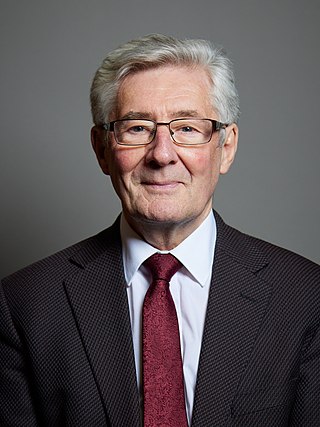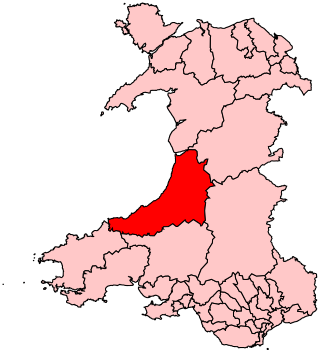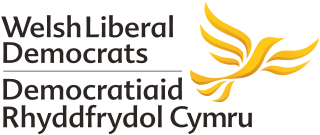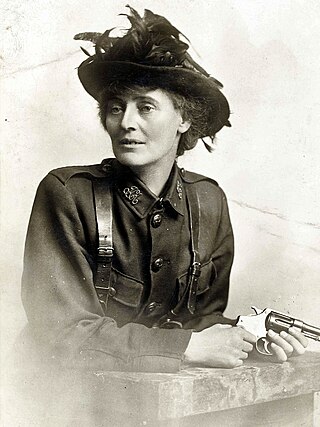
The United Kingdom is a constitutional monarchy which, by legislation and convention, operates as a unitary parliamentary democracy. A hereditary monarch, currently King Charles III, serves as head of state while the Prime Minister of the United Kingdom, currently Sir Keir Starmer since 2024, serves as the head of the elected government.

Sir Anthony Joseph Lloyd was a British Labour politician. He served as a member of Parliament (MP) for 36 years, making him one of the longest-serving MPs in recent history. He served as MP for Stretford from 1983 to 1997, Manchester Central from 1997 to 2012, and represented Rochdale from 2017 until his death in 2024. He was Greater Manchester Police and Crime Commissioner between 2012 and 2017 and served as the interim Mayor of Greater Manchester in his last two years in the role.

The 1935 United Kingdom general election was held on Thursday 14 November 1935. It resulted in a second landslide victory for the three-party National Government, which was led by Stanley Baldwin of the Conservative Party after the resignation of Ramsay MacDonald due to ill health earlier in the year. It is the most recent British general election to have seen any party or alliance of parties win a majority of the popular vote.

The 1929 United Kingdom general election was held on Thursday, 30 May 1929, and resulted in a hung parliament. Ramsay MacDonald's Labour Party won the most seats in the House of Commons for the first time despite receiving fewer votes than the Conservative Party, led by Prime Minister Stanley Baldwin. The Liberal Party, led again by former Prime Minister David Lloyd George, regained some of the ground lost in the 1924 general election and held the balance of power. Parliament was dissolved on 10 May.

The 1924 United Kingdom general election was held on Wednesday 29 October 1924, as a result of the defeat of the Labour minority government, led by Prime Minister Ramsay MacDonald, in the House of Commons on a motion of no confidence. It was the third general election to be held in less than two years. Parliament was dissolved on 9 October.

The 1918 United Kingdom general election was called immediately after the Armistice with Germany which ended the First World War, and was held on Saturday, 14 December 1918. The governing coalition, under Prime Minister David Lloyd George, sent letters of endorsement to candidates who supported the coalition government. These were nicknamed "Coalition Coupons", and led to the election being known as the "coupon election". The result was a massive landslide in favour of the coalition, comprising primarily the Conservatives and Coalition Liberals, with massive losses for Liberals who were not endorsed. Nearly all the Liberal MPs without coupons were defeated, including party leader H. H. Asquith.

Ceredigion was a parliamentary constituency represented in the House of Commons of the UK Parliament. Created in 1536, the franchise expanded in the late 19th century and on the enfranchisement of women. Its boundaries remained virtually unchanged until 1983. From 1536 until 1885 the area had two seats : a county constituency (Cardiganshire) comprising the rural areas, the other the borough constituency known as the Cardigan District of Boroughs comprising a few separate towns; in 1885 the latter was abolished, its towns and electors incorporated into the former, reduced to one MP. The towns which comprised the Boroughs varied slightly over this long period, but primarily consisted of Cardigan, Aberystwyth, Lampeter and Adpar, the latter now a suburb of Newcastle Emlyn across the Teifi, in Carmarthenshire.

Montgomeryshire was a constituency in Wales represented in the House of Commons of the UK Parliament.

The 2005 United Kingdom general election was held on Thursday 5 May 2005, to elect 646 members to the House of Commons. The governing Labour Party led by Prime Minister Tony Blair won its third consecutive victory, with Blair becoming the second Labour leader after Harold Wilson to form three majority governments. However, its majority fell to 66 seats; the majority it won four years earlier had been of 167 seats. The UK media interpreted the results as an indicator of a breakdown in trust in the government, and especially in Blair.

The Welsh Liberal Democrats is a liberal, federalist political party in Wales, part of UK Liberal Democrats. The party is led by Jane Dodds, who has served as an MS for Mid and West Wales since May 2021. The party currently has one elected member in the Senedd and one Welsh seat in the UK House of Commons. It also has several members of the House of Lords. The party had 69 local councillors serving in principal authorities as of the 2022 local authority elections, up 10 from 2017.
The 1943 University of Wales by-election was a parliamentary by-election held in the United Kingdom between 25 and 29 January 1943 for the House of Commons constituency of University of Wales.
The 1890 Caernarvon Boroughs by-election was a parliamentary by-election held on 10 April 1890 for the British House of Commons constituency of Caernarvon Boroughs.
The 1932 Cardiganshire by-election was a parliamentary by-election held on 22 September 1932 for the British House of Commons constituency of Cardiganshire.

The representation of women in the House of Commons of the United Kingdom has been an issue in the politics of the United Kingdom at numerous points in the 20th and 21st centuries. Originally debate centred on whether women should be allowed to vote and stand for election as Members of Parliament. The Parliament Act 1918 gave women over 21 the right to stand for election as a Member of Parliament. The United Kingdom has had three female Prime Ministers: Margaret Thatcher (1979–1990), Theresa May (2016–2019), and Liz Truss (2022). The publication of the book Women in the House by Elizabeth Vallance in 1979 highlighted the under-representation of women in Parliament. In more modern times concerns about the under-representation of women led the Labour Party to introduce and, decades later, abandon all-women short lists, something which was later held to breach discrimination laws.











